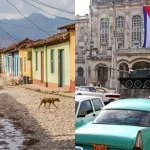Despite being a communist country, Cuba is also improving its diplomatic ties with the US, which hopes that very soon all Americans will be able to travel to Cuba as freely as they want. The world believes that Cuba is a mixture of different cultures and influences with a most extensive past. Some strange facts about the country you’ve probably never seen are here.
Hitchhiking Is The Norm
Passengers in Cuba can hitch a ride in government vehicles, if there’s space. It is encouraged to hitchhike because the country doesn’t have so many cars, and hitchhikers use designated areas. Drivers pick riders up on a first come, first serve basis.

Hitchhiking is simply getting into somebody’s car (or some other vehicle) and asking him to take you as far as he or she can. After the collapse of the Soviet Union, hitchhiking was necessary.
Ballet Is Big Here
For the most part, the dance scene in Cuba has always revolved around salsa, son, and rumba. However, according to those in the know, the Caribbean Island is one of the main stages of the world’s best ballet.

Ballet here took off after legendary ballerina Alicia Alonso founded the Ballet Nacional de Cuba in 1948, which is now one of the world’s most prestigious dance companies. Despite some early difficulties, the company received crucial assistance from Fidel Castro and his revolutionary movement in 1959, after Alonso lent him her support.
Not Internet Friendly
Since the list’s inception in 2006, Reporters Without Borders has designated Cuba as an “Internet Enemy.” Certain websites are blocked by the Cuban government outright. While blocking access to specific websites is possible, it is not very widespread.

The censorship of the internet has loosened in recent years. For example, in 2007, the general public was able to purchase a computer legally. Digital media is beginning to play a more prominent role in disseminating information about events in Cuba to the rest of the world.
Travel Restrictions
Since 1960, when Fidel Castro took power, the U.S. government has restricted travel to Cuba, and this restriction continues to this day, owing to the fear of communism here.

Journalists, academics, government officials, those with immediate family members living on the island, and others licensed by the Treasury Department were initially excluded from sanctioned travel. These rules were changed in 2011 to allow all Americans to visit Cuba if they were on a “people-to-people” cultural exchange tour.





